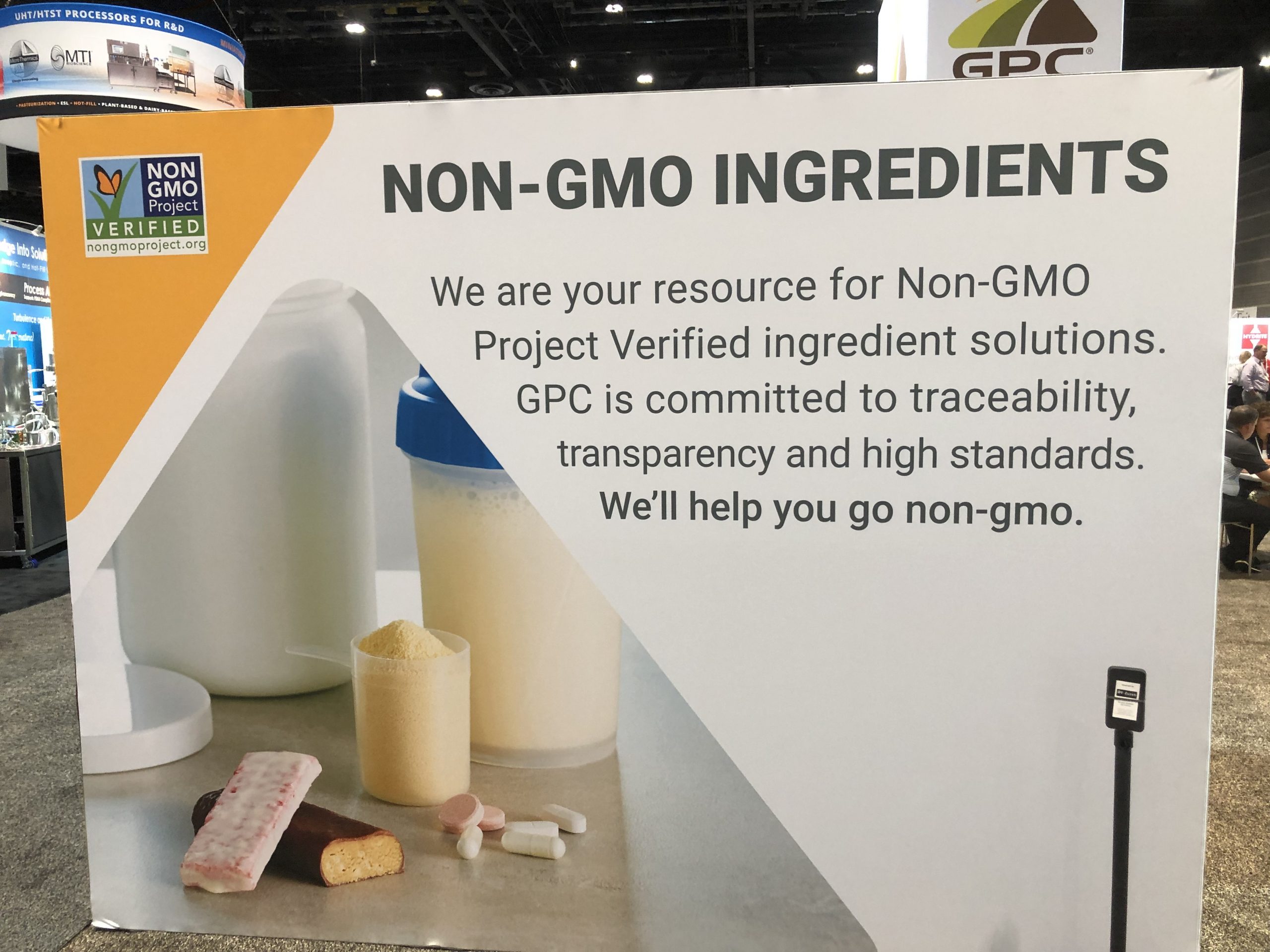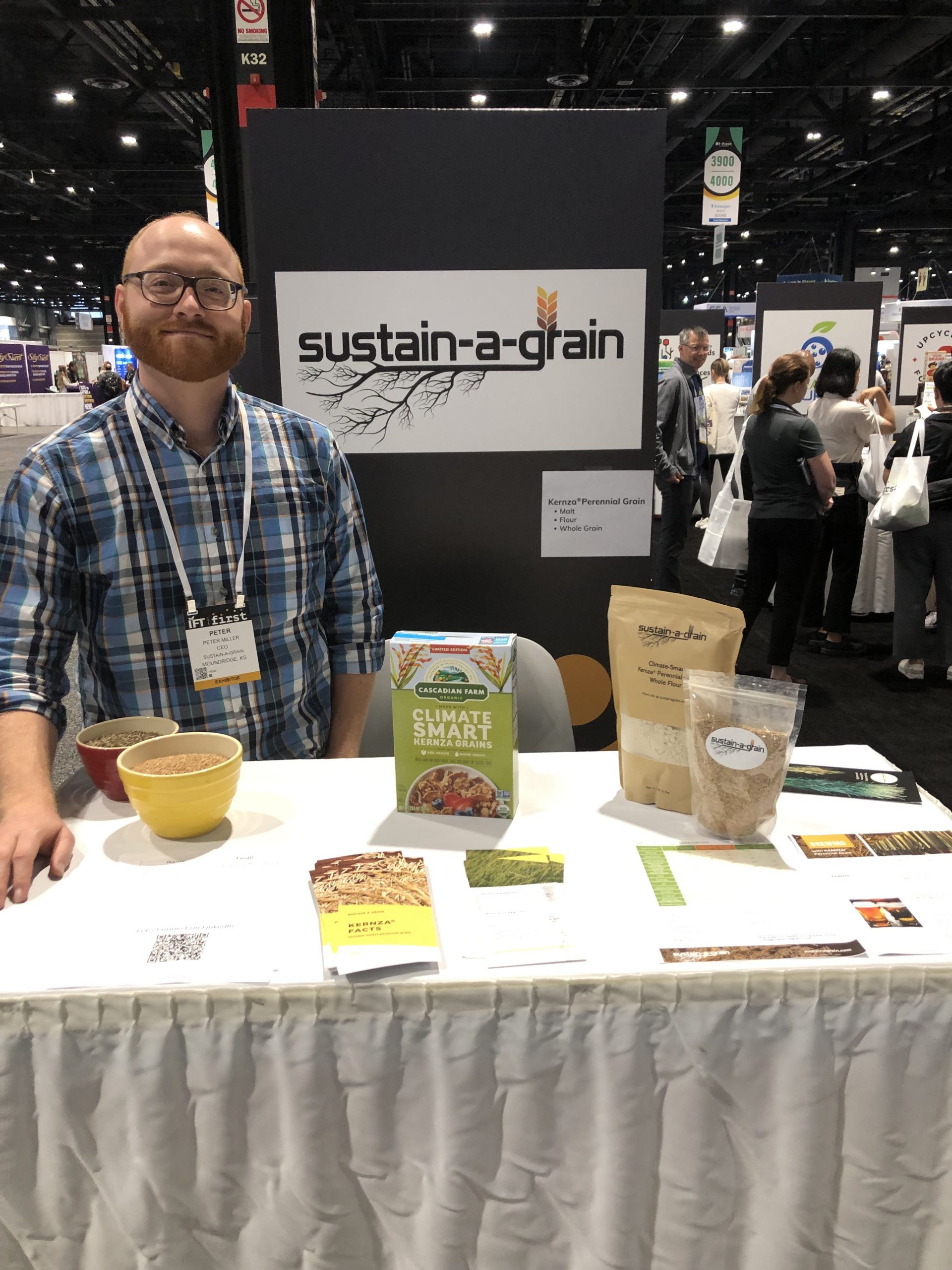Plant-based foods, upcycling, new GMO technologies were leading trends at ingredients tradeshow.
The Institute of Food Technologists (IFT) Expo, which was held in July in Chicago, presents an interesting dichotomy. On the one hand, IFT, an organization of food scientists, supports development of genetically engineered foods. Educational sessions at the Expo tend to tout the benefits of GMOs including new technologies such as synthetic biology and cell cultured meat. On the other hand, the tradeshow floor featured many companies promoting their organic and/or non-GMO ingredients. The Non-GMO Project butterfly was a common site at the show where it was displayed at company booths. There was an Organic Pavilion featuring companies selling organic ingredients.
An estimated 15,000 people attended this year’s Expo, and more than 750 exhibiting companies showcased their products and services.
Companies exhibiting at IFT Expo ranged from industry giants like ADM and Cargill to start-ups and small players like Kansas-based Sustain-a-Grain, which promoted its Kernza perennial grain, and Victory Hemp with its hemp-based food products.
Some highlights:
- Plant-based foods were a major trend at the show with companies promoting their ingredients for plant-based products. InnovoPro introduced their Non-GMO Project Verified chickpea protein concentrate, CP-PRO70, and CP-XTURA™ 65 textured vegetable protein. InnovoPro sources chickpeas, which are the world’s third most widely grown legume, from North American farmers.
- Another interesting company providing plant-based ingredients was CK Ingredients, which supplies protein and flour from lupin beans, which are high in protein, fiber, and antioxidants. Lupin beans are grown in Europe, Australia, and the Americas.
- Sustain-a-Grain, a farmer-led business, showed samples of Kernza, a perennial intermediate wheatgrass, that companies such as General Mills and Patagonia are starting to use in foods and beverages. Sustain-a-Grain’s CEO, Peter Miller, told me about the promises of Kernza as a way to improve soil and water quality. Sustain-a-Grain is building a network of farmers in Kansas, Nebraska, and Iowa to grow Kernza.
- Terviva introduced their new oil and protein products from pongamia, a climate-resilient tree which helps to reforest land and revitalize communities.
- Regenerative agriculture was one of the food trends cited by Innova Market Insights at their booth. Innova’s database shows a growth rate of more than 20% in new food and beverage launches with a regenerative agriculture claim.
- Among the top 10 trends in 2022 cited by Innova was the growing importance of the gut microbiome, which Innova says “has the potential to be a game changer in how consumers manage their health.”
- Upcycling was another big trend at IFT Expo. By-products of food production that were considered waste are now being upcycled to make ingredients or food products. Upcycled Foods, Inc. promoted its ReGrained Supergrain made from spent brewing grains. The company claims to have upcycled more than 650,000 pounds of grain.
- The Upcycled Foods Association (UFA) was also an exhibitor at IFT Expo. UFA has some 200 members and growing. The upcycled food market is worth an estimated $46.7 billion, according to Food Dive.
- Representatives from Ardent Mills, a major flour miller, gave a presentation about the increasing use of alternative sustainable grains and crops such as chickpeas, lentils, quinoa, peas, and millet as ingredients.
-

- The Non-GMO Project butterfly was a common sight at IFT Expo
“Program biology like computers?”
Synthetic biology company Ginkgo Bioworks exhibited at IFT Expo, touting their products made from precision fermentation technology. Ginkgo is described as “a horizontal cell programming platform.” Two of their representatives gave a presentation, “Leveraging Synthetic Biology.” Sushrita Venkatraman, marketing representative, claimed her company can help solve challenging problems and “unlock massive quantities of scale” to take advantage of the market for alternative proteins and ingredients.
“Our mission is to make biology easier to engineer,” she claimed.
She also said Ginkgo “programs cells like computer programmers program computers.” Such a claim is a massive stretch bordering on being dangerous since biology is infinitely more complex than computers—though the second speaker acknowledged that programming cells is a “very complex process.”
-

- Panelists discussed the challenges of consumer acceptance of lab-created meats
Will consumers accept “unnatural” lab-grown meats?
The final keynote session at IFT Expo focused on another complex technology, lab-grown or cultured meat, which are meat products including seafood that are produced by cultivating animal cells using a combination of biotechnology, tissue engineering, molecular biology, and synthetic processes. Supporters claim such products “eliminate the need to raise and farm animals for food.”
The session, “Consumer acceptance as barrier and opportunity for novel food technology,” discussed the challenges facing the emerging cell based or cultured meat sector. William Hallman, professor and chair of the department of human ecology at Rutgers University, said that 70 companies are developing lab-grown meat products. He said the sector needs to develop a name for the technology that will balance marketing considerations with regulatory concerns and provide transparency to consumers. Andrew Noyes, head of global communications and public affairs at lab-grown meat company Good Meat, called the sector a “very young industry” that needs to educate consumers about the technology. He said that lab-grown meat products have not yet received regulatory approval from the U.S. Food and Drug Administration and Department of Agriculture. Sydney Scott, assistant professor of marketing at Washington University in St. Louis, said that, based on her research, people have a deeply held belief that natural is better.
“(They think) creating food in an unnatural way is morally wrong and think we shouldn’t be doing this,” citing consumer concerns with genetically engineered foods as an example. She said people may feel that way about cell-based meat and presenting evidence that such products are safe won’t convince them. As a result, she said that lab-grown meat producers need to “engage with consumers on a moral level.”
Hallman also compared the situation with lab-grown meats to GMOs and said that people are emotional about food. “Like GMOs, some consumers won’t want cell-based meats,” he said.
Organic & Non-GMO Insights August 2022





